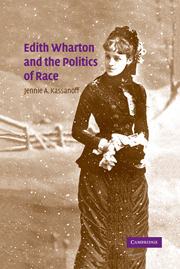Book contents
- Frontmatter
- Contents
- Acknowledgements
- Introduction
- 1 Invaders and Aborigines: playing Indian in the Land of Letters
- 2 “The real Lily Bart”: staging race in The House of Mirth
- 3 “A close corporation”: the body and the machine in The Fruit of the Tree
- 4 The Age of Experience: pragmatism, the Titanic and The Reef
- 5 Charity begins at home: Summer and the erotic tourist
- 6 Coda: The Age of Innocence and the Cesnola controversy
- Notes
- Bibliography
- Index
4 - The Age of Experience: pragmatism, the Titanic and The Reef
Published online by Cambridge University Press: 22 September 2009
- Frontmatter
- Contents
- Acknowledgements
- Introduction
- 1 Invaders and Aborigines: playing Indian in the Land of Letters
- 2 “The real Lily Bart”: staging race in The House of Mirth
- 3 “A close corporation”: the body and the machine in The Fruit of the Tree
- 4 The Age of Experience: pragmatism, the Titanic and The Reef
- 5 Charity begins at home: Summer and the erotic tourist
- 6 Coda: The Age of Innocence and the Cesnola controversy
- Notes
- Bibliography
- Index
Summary
In the early hours of April 15, 1912, the H. M. S. Titanic, making her maiden voyage from Southampton, England to New York, struck an iceberg 400 miles off the coast of Newfoundland, taking 1,503 people to their deaths in the frigid waters of the North Atlantic (Biel 21). Edith Wharton was in the midst of writing a new novel, The Reef. She devoted the lion's share of that spring and summer to completing the manuscript. She paused long enough that July, however, to accompany Henry James to Cliveden, the expansive Buckinghamshire estate of Waldorf and Nancy Astor. There, they met 19-year-old Madeline Astor, a Titanic survivor and recent widow whose husband, John Jacob Astor IV, had famously gone down with the doomed vessel. Although we do not have a record of what the Cliveden party discussed, it is certain that the recent disaster was on everyone's mind.
Indeed, a number of Wharton's close friends were deeply distressed. James, for one, wrote to Mrs. Francis D. Millet to express his condolences for the death of her husband “in the midst of all the horrors and misery” (H. James, Letters 613). Elizabeth Cameron, a Paris hostess, told Wharton that she had received several worrisome letters from Henry Adams, who – as fate would have it – had booked passage aboard the ship's anticipated return voyage to Europe. “This Titanic blow shatters one's nerves,” Adams had written. “We can't grapple it” (Adams, Letters 535).
- Type
- Chapter
- Information
- Edith Wharton and the Politics of Race , pp. 83 - 111Publisher: Cambridge University PressPrint publication year: 2004



